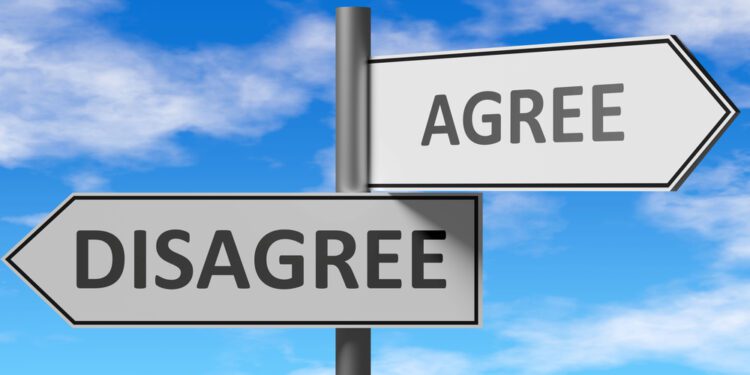Senior leaders must hear the full, unvarnished truth from employees. Use simple rules of thumb and checklists to gauge and ensure your organization’s openness to productive dissent.
“You don’t bring bad news” explained a former WeWork employee. As outsiders shared skepticism about WeWork’s business model and a series of red flags sprang up in the months prior to the organization’s implosion in 2019, disbelieving senior employees remained silent. They did not want to be the bearers of bad news to their CEO at the time. Although the organization has since moved on under new leadership, the WeWork story is emblematic of a broader trend: In this era of polarization and rancorous discourse in all realms of society, it is increasingly difficult to have open and productive disagreements at work.
A survey of 6,000 tech employees found that 17.5% of them do not speak up at all to their managers. Situations like this are particularly unfortunate because team and corporate performance are contingent upon a culture in which employees feel free to communicate their ideas and opinions as they work together and solve problems. While many organizations may not view their culture as one that actively suppresses disagreement, few foster a culture in which open and productive debate is a cornerstone. As a result, it becomes ever harder for senior leaders to get the full, unvarnished truth from employees, and they can end up making big decisions based on half-truths or incomplete data.
Why Encourage Debate?
Failure avoidance is only one reason why leaders should prioritize open disagreement. Healthy debate also amplifies innovation. In 1921, when William Knudsen, one of Ford Motor’s top engineers and a leading expert in flexible mass production, offered Henry Ford his sketches for producing customized Model Ts, the company’s autocratic founder simply walked away. Ford paid a costly price for not engaging in a debate with a subordinate; soon after, Knudsen joined General Motors and implemented his ideas as the head of Chevrolet, narrowing the Model T-to-Chevy sales ratio from 13:1 to 2:1 in just five years.
Repressing alternative opinions also hurts employee engagement and retention. Just as Knudsen promptly left Ford, employees who do not feel comfortable speaking up at work are less likely to want to stay with their company. By repelling employees who think differently, organizations can inadvertently create a consensus-driven culture and fall prey to group think.
Organizations that inhibit debate are also vulnerable to “decision spin”—a costly phenomenon wherein decisions bounce around the company, from group to group and up and down the hierarchy, frequently accompanied by requests for more analysis or options. Decision spin reduces productivity and the quality of output. Executives leave meetings in apparent agreement to a proposed plan of action, but nothing is done. Oftentimes it is not unexpected factors that hamper success but known factors that were either not surfaced or not taken seriously.
The business imperative of nurturing a culture of productive disagreement is clear. The good news is that senior leaders can play a highly influential role in this regard. By integrating the concepts of openness and healthy debate into their own and their organization’s language they can institutionalize new norms. Their actions can help to further reset the rules of engagement by serving as a model for employees to follow.
We propose a series of tactical strategies and offer a three-part Disagreement Temperature Checklist that senior leaders can employ to encourage employees to speak truth to power and to each other. To help promote a culture based in truth, evaluate the prevalence of debate in your organization’s culture and team dynamics. Ask yourself the questions in the following checklists on a weekly or monthly basis to assess whether you and your team embody and actively instill the values of debate in your organization.
Institutionalize: Make Debate a Core Tenet of Your Organization
In 2018, a BCG study of 100,000 corporate filings revealed that companies that described themselves using humanistic language including words that support debate and diverse opinions, such as truth, true, fact, and transparency, enjoyed a 0.7% premium in annual growth and a 0.6% premium in annual shareholder returns over a three-year period, as well as enhanced employee engagement and management diversity. Yet few companies have explicitly stated organizational values around upholding and seeking truth, respecting facts, and encouraging debate.
Leaders should incorporate the concept of productive debate into corporate value statements and the way they address colleagues, employees, and shareholders. Michelin, for example, built debate into its value statement. One of its organizational values is “respect for facts,” which it describes as follows: “We utilize facts to learn, honestly challenge our beliefs….” Another company that espouses debate as value is Bridgewater. Founder Ray Dalio ingrained principles and subprinciples such as “be radically open-minded” and “appreciate the art of thoughtful disagreement” in the investment management company’s culture. The company’s website states, “Bridgewater’s competitive edge is our pioneering workplace culture that relies on truthful and transparent communication to ensure the best ideas win out.”
Leaders should also highlight—and repeat often—values such as “truth seeking” and “debate” as priorities when undertaking major initiatives and as part and parcel of the desired end state in transformation efforts. Before the invasion of Normandy, Dwight D. Eisenhower told his senior commanders, “I consider it the duty of anyone who sees a flaw in this plan not to hesitate to say so. I have no sympathy with anyone, whatever his station, who will not brook criticism. We are here to get the best possible results.”
Courtesy BCG. Click here for full report












